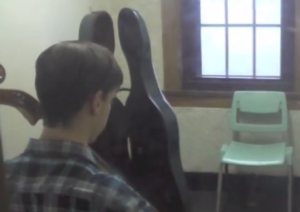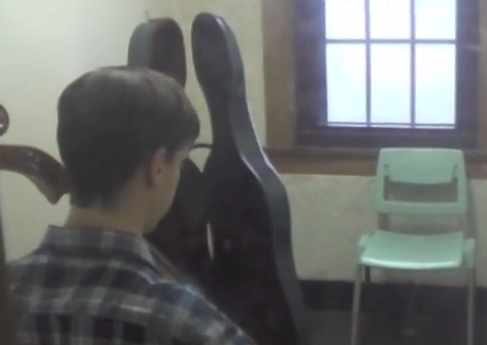Practicing for the Right Reasons
 Last week, I wrote about the challenges high school students face when attempting to find practice time whilst juggling a myriad of other commitments. I concluded that making time for the instrument is certainly possible if one plans ahead and makes the most of their allotted practice hours, but there remains one key ingredient necessary to ensure continuous progress and success: MOTIVATION. For some students, there is no problem mustering the determination to pick up their instrument and practice it effectively, but for many, the right incentive can prove somewhat elusive. Considering the situation from my perspective as a long-time student (and relatively new teacher), it is my observation that students are motivated to practice through several different means–some more constructive than others–and so I thought it might be worthwhile to explore those means here.
Last week, I wrote about the challenges high school students face when attempting to find practice time whilst juggling a myriad of other commitments. I concluded that making time for the instrument is certainly possible if one plans ahead and makes the most of their allotted practice hours, but there remains one key ingredient necessary to ensure continuous progress and success: MOTIVATION. For some students, there is no problem mustering the determination to pick up their instrument and practice it effectively, but for many, the right incentive can prove somewhat elusive. Considering the situation from my perspective as a long-time student (and relatively new teacher), it is my observation that students are motivated to practice through several different means–some more constructive than others–and so I thought it might be worthwhile to explore those means here.
The first and most important thing to consider when discussing practice motivation is that the motivation ultimately has to come from the self. I have seen far too many situations where a student reaches a high ability for their age, but has no love for what they are doing because they reached that ability under pressure from a parent or guardian. Obviously, it’s very important that regular practice habits are enforced from the beginning of a student’s studies, but once a student starts high school, I really think that encouragement should be the extent of a parent’s involvement. As I have mentioned in other posts, I didn’t practice much during my first couple years of high school, and my parents didn’t get on my case about it. People are often surprised to hear this, since my parents are professional musicians, but it is true that they didn’t put a ton of pressure on me. As a result, when I decided to become more dedicated, it was entirely my decision and the subsequent improvement process was extremely rewarding. I feel like a lot of parents hold the belief that if their kid practices four hours a day from the age of three, they will become the next Yo-Yo or Itzhak, but of course it is not how long one practices that matters so much as HOW one practices. It was Leopold Auer, one of the most distinguished violin pedagogues in history, who famously stated, “If you practice with your head, two hours is plenty. If you practice with your fingers, no time is enough.” Of course, if you have two quartets, a ream of orchestra music and the Elgar concerto to learn, you might need more than two hours to get through everything, but the point remains: the quality of your practice is exponentially more important than the quantity. I certainly don’t mean to criticize “stage parents” or however one wishes to refer to them, as often times students do need that extra nudge to stay focused and motivated. But a student’s enjoyment of practicing, and playing music, should always be the most important factor to consider when taking a greater hand in their practice routine.
On the other side of the spectrum, we find the group of students whom I refer to as the “Soccer Practicers.” In the minds of these students, orchestra and lessons are no different than soccer practice–you show up, do what the coach says, go home and put your ball in the garage, and then pick it up the next week when it’s time to practice again. In my junior high years, I certainly fit into this category; there were many weeks when, upon returning home from youth orchestra, I’d tuck my cello in the corner of the living room and not even come within a five foot radius of it until it was time for the next rehearsal. In retrospect, I kind of wish I had practiced it a bit more in those days, as it would have made my high school years much easier and perhaps allowed for me to have more opportunities, but I had other things on my mind in junior high.
As a result, I highly sympathize with the “soccer practicers,” but as a teacher, I have to be very careful with the expectations I set for them. I know I can’t expect them to practice every day, and to come back having fixed everything I’ve told them to fix. However, I can encourage them to get to their practicing daily, even if for a short time, and demonstrate that we’re going to keep working on the same stuff until they put in time on their end (often this tends to be quite effective, since students don’t really enjoy doing the same thing over and over). That said, I am highly against actually becoming angry with students. My teachers never got too hotheaded with me, but I’ve sat under a lot of angry conductors in student orchestras, and they never had many fans. However lazy a student might be, they will be much more inclined to work for a teacher who demonstrates kindness than one who will reliably read them the “riot act” at every lesson. Firmness is good, and some “serious talks” can also be effective, depending on the student. But I really don’t think there is a cause to yell at anybody. They didn’t commit some terrible crime; they just didn’t practice their etude.
But there is a source of motivation that is still worse than a red-faced teacher with high blood pressure: jealousy. Often times a student will be muddling along, putting in their 20 minutes a day, until they go to a concert and see some hotshot a year younger than them playing the Sibelius violin concerto. Before anyone can say, “Wait, you’re only on La Folia!”, the student has become inseparable from their instrument, determined to match and surpass the ability of their advanced colleague. This is not a good situation, for several reasons: first, it is often difficult for students to advance their ability in a short period of time, and it is likely that more frustration than progress will result. Secondly, it is quite common for students to blame others for their lack of progress instead of themselves. I’ve known students who actually switched teachers because they felt their current teacher was surely at fault for their absmal chair placement in youth orchestra (somehow all memories of the lessons leading up to the unfavorable placement, in which the teacher admonished them adamantly to practice with a metronome, are suddenly forgotten). And finally, having jealousy as an incentive separates a student from the real purpose of playing an instrument: making music! Contrary to popular belief, humans didn’t start studying instruments to engage in vicious competition with each other; in fact, many musical traditions are religious in origin, and came as a result of humans’ infinite search for meaning in their lives. After hundreds of years, we managed to evolve to an extent where we could compose and perform highly complex pieces, which is wonderful, but using such works as a vehicle for a advancing one’s personal interests is really missing the point. So yeah, jealousy = not good.
Of course, there are many other sources of motivation, both good and bad, and in a way, I think we each have our own unique reasons for practicing an instrument, because each of us has something individual and special to offer through our music. In the end, though, discerning whether your personal incentive is constructive and positive is not all that challenging. Just ask yourself: am I practicing for me, or for those who will listen to me? If the answer is “for those who will listen to me,” you are almost certainly on the right track.

